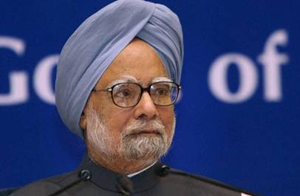
New Delhi, Jul 20: Admitting that “things are going bad,” Prime Minister Manmohan Singh told India Inc on Friday that growth will be less than the targeted 6.5 per cent, but promised that the government would “leave no stone unturned” to revive the sagging economy.
Singh’s address at the 92nd annual general meeting of Assocham in the Capital was in many ways an acknowledgement of the people’s plight due to the poor fiscal health.
Singh, however, took on his political adversaries, accusing them of restricting their focus on “the experience of one bad year,” which, the prime minister said, “makes for good television” but presents a “very distorted picture.”
“I would not like to make a forecast of what our growth will be in the year 2013-14. The IMF has recently reduced its earlier projection of growth rates for all countries including India for 2013. We had targeted 6.5 per cent growth when the Budget was presented. But it looks as if it will be lower than that. Industrial growth has not yet recovered. However, I am happy to say that agriculture looks well set to show a good performance,” Singh stated.
He also presented facts and figures to counter charges that policy paralysis has stymied the growth.
Singh reiterated that external factors are having a “dumbing down impact” on the economy. He said much of the volatility in the foreign exchange market “was due to global markets reacting to the likelihood of a withdrawal of Quantitative Easing III by the US Federal Reserve Bank.”
Perhaps eyeing the ensuing Assembly and Lok Sabha elections, the prime minister stressed that the UPA “has a record which any government would be proud of.”
He cited steps taken by the government and new initiatives in line to offset criticisms that the economist prime minister has lost his touch to stitch the economy back to shape. Measures for bringing current account deficit under control, correcting price of petroleum and removing constraints to bolster export of ores are some of the efforts, he pointed out.
Realising that there was no quick-fix way to address the problem, Singh said: “I must emphasise that it is not the exact growth number for 2013-14 that matters. What is important is that the economy should turn around from five per cent last year.”
“There is a very good chance that we can achieve that with good agricultural performance and the effect of various actions we are taking on infrastructure. Thereafter, we will try to accelerate to higher grounds in 2014-15.” Singh also compared the economic parameters of the two UPA terms with the NDA regime.
The BJP launched a counter-offensive on Singh’s claim that the UPA fared better than the NDA. BJP leader Yashwant Sinha said Singh was being “intellectually dishonest” by comparing the growth during the UPA and the NDA regimes.
“The prime minister is being less than intellectually honest when he is comparing the NDA to the UPA. It is the usual trick of intellectual dishonesty to dress up facts and figures. So, he is not talking of five per cent growth but of an average of eight years,” Sinha said.






Comments
Add new comment